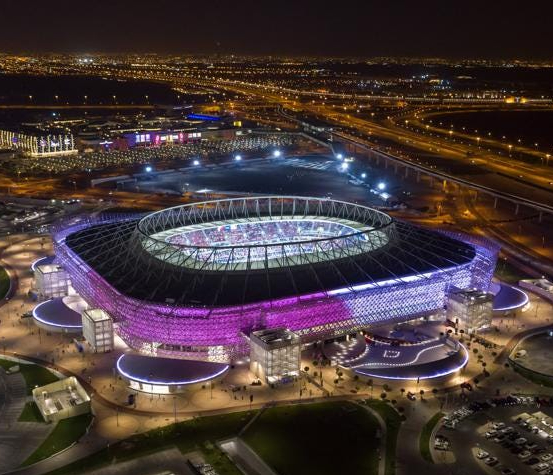
2022/Supreme Committee Via Getty Images
Soccer is the world’s most popular sport, and its biggest event is currently underway. The World Cup is the ultimate soccer competition, where countries pool their best players into a
a national team and compete against each other for three weeks leading up to the coveted championship match. The men’s World Cup has been held every four years beginning in 1930, except for 1942 and 1946, due to World War II. This year’s World Cup is being held in Qatar, a Middle Eastern country with a population of almost three million. It is the smallest nation to have ever hosted the event and was chosen for this honor by the International of Association Football (FIFA), which presides over international soccer competitions and the World Cup.
The choice for Qatar to host the 2022 World Cup was made in 2010, but since then there have been allegations of bribery amongst FIFA employees tasked with the decision. Additionally, many human-rights-related complaints have been lodged against Qatar.
The country lacked the necessary infrastructure to support the event and thus began a series of construction projects that would build hotels and stadiums. Migrant workers were the main source of labor for these projects. They vastly outnumber Qatari citizens and come looking for work and income, in many cases, to send back money to their families. However, migrant workers have died during the construction process, although the exact number is debated, and this has resulted in allegations of negligence against Qatar. Many workers were required to pay recruitment fees, which is illegal. Wages were relatively low and FIFA has thus far seemed powerless to stop any of these injustices.
Unfortunately, migrant workers’ rights aren’t the only alleged human rights violations. Qatar is a relatively conservative Muslim country and anti-gay sentiment is high. LGBTQ+ people have been reported as being subject to conversion therapy, while gay and lesbian sex is illegal and punishable by prison time. In fact, the Qatari ambassador to the World Cup recently went so far as to say that homosexuality is “damage in the mind”. Many advocates are concerned as to why FIFA would allow such an obviously homophobic country to host the World Cup.
Qatar’s conservative Islamic beliefs are not only seen in their sexuality policies but also in their refusal to have alcoholic beverages served in the World Cup stadiums. This decision has been criticized because Qatar initially agreed to allow alcohol and then reneged on its promise. Budweiser paid millions of dollars to become the official alcohol sponsor of the World Cup but is now not permitted to sell any drinks except the non-alcoholic Bud Zero.
Controversies aside, this year’s World Cup is bound to be interesting with the United States reappearing after not qualifying in 2018 and the predicted dominance of Brazil. The latter has won first place five times but has not emerged on top since 2002. Countries participating in the World Cup are placed into eight groups of four. The thirty-two teams then play their group members once each. Three points are awarded to the winning team and if it is a draw, both teams receive one point. The two
teams with the highest point totals in each group move on to the knockout stage. The sixteen remaining teams are whittled down to the two finalists, who play each other in the final round.
Although controversy has been abundant this year, billions of fans will still cheer on their favorite teams and the finals will attract a gigantic crowd of viewers. The championship will be played on December 18th and Brazil, Spain, and France are the three front runners. Maybe Brazil will finally win again after a drought of twenty years, or perhaps the French will defend their 2018 title. Only time will tell. But this year’s global soccer season has provided many with food for thought regarding humanitarian causes such as the plight of migrant workers and oppression of the LGBTQ+ community. FIFA’s seeming inability to control Qatar is concerning and will hopefully lead to a discussion, and eventually action as to how future World Cups can be better managed with an emphasis on human rights.
